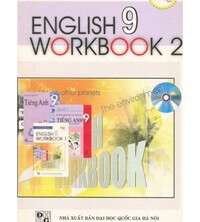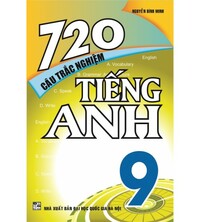Tiếng Anh 9 Progress review 3
1. Complete the sentences with one of the words from each pair. 2. Complete the sentences with the noun form of the words in brackets. 3. Complete the dialogue with the gerund or infinitive form of the verbs in the box.
Bài 1
1. Complete the sentences with one of the words from each pair.
(Hoàn thành câu với một trong các từ trong mỗi cặp.)
|
adapt / adaptation – create / creation – discover / discovery explore / exploration – imagine / imagination – invent / invention |
1. Scientists now think that there is water on Mars. That’s an amazing _____.
2. Ava developed some great ideas for our design project. She has a fantastic _____.
3. Scientists want to _____ the Amazon and look for new types of animals and plants.
4. Hezârfen Ahmed Çelebi created a new _____ in the 17th century – it was a set of special ‘bird wings’ that he could fly with.
5. Could you _____ to living in space?
6. The two governments want to work together and _____ a space programme.
Lời giải chi tiết:

1. Scientists now think that there is water on Mars. That’s an amazing discovery.
(Các nhà khoa học hiện nay cho rằng có nước trên sao Hỏa. Đó là một khám phá tuyệt vời.)
Giải thích: cụm danh từ “a amazing _____” => cần điền danh từ
2. Ava developed some great ideas for our design project. She has a fantastic imagination.
(Ava đã phát triển một số ý tưởng tuyệt vời cho dự án thiết kế của chúng tôi. Cô ấy có một trí tưởng tượng tuyệt vời.)
Giải thích: cụm danh từ “a fantastic _____” => cần điền danh từ
3. Scientists want to explore the Amazon and look for new types of animals and plants.
(Các nhà khoa học muốn khám phá Amazon và tìm kiếm các loại động vật và thực vật mới.)
Giải thích: cấu trúc: want + to V nguyên thể: muốn làm gì => cần điền động từ
4. Hezârfen Ahmed Çelebi created a new invention in the 17th century – it was a set of special ‘bird wings’ that he could fly with.
(Hezârfen Ahmed Çelebi đã tạo ra một phát minh mới vào thế kỷ 17 – đó là một bộ ‘cánh chim’ đặc biệt mà ông có thể dùng để bay.)
Giải thích: cụm danh từ “a new _____” => cần điền danh từ
5. Could you adapt to living in space?
(Bạn có thể thích nghi với cuộc sống trong không gian không?)
Giải thích: cấu trúc: Could + S + V nguyên thể + …?: Ai đó có thể làm gì không? => cần điền động từ
6. The two governments want to work together and create a space programme.
(Chính phủ hai nước mong muốn hợp tác và xây dựng một chương trình không gian.)
Giải thích: cấu trúc: want + to V nguyên thể: muốn làm gì => cần điền động từ
Bài 2
2. Complete the sentences with the noun form of the words in brackets.
(Hoàn thành câu với dạng danh từ của từ trong ngoặc.)
1. The _____ of space has led to numerous scientific breakthroughs. (explore)
2. The _____ of technology has significantly impacted our daily lives. (develop)
3. The _____ in digital technology have improved the way we perform daily tasks such as navigating traffic. (advance)
4. Alexander Graham Bell’s _____ of the telephone led to modern telecommunications technology. (invent)
5. Effective _____ plays an important role in building strong relationships. (communicate)
Lời giải chi tiết:

1. The exploration of space has led to numerous scientific breakthroughs.
(Việc khám phá không gian đã dẫn đến nhiều đột phá về mặt khoa học.)
Giải thích: động từ “explore” – khám phá => danh từ “exploration” – sự khám phá
2. The development of technology has significantly impacted our daily lives.
(Sự phát triển của công nghệ đã tác động đáng kể đến cuộc sống hàng ngày của chúng ta.)
Giải thích: động từ “develop” – phát triển => danh từ “development” – sự phát triển
3. The advancements in digital technology have improved the way we perform daily tasks such as navigating traffic.
(Những tiến bộ trong công nghệ kỹ thuật số đã cải thiện cách chúng ta thực hiện các công việc hàng ngày như điều hướng giao thông.)
Giải thích: động từ “advance” – tiến bộ => danh từ “advancement” – sự tiến bộ => dạng số nhiều “advancements”
4. Alexander Graham Bell’s invention of the telephone led to modern telecommunications technology.
(Phát minh ra điện thoại của Alexander Graham Bell đã dẫn tới công nghệ viễn thông hiện đại.)
Giải thích: động từ “invent” – phát minh => danh từ “invention” – sự phát minh
5. Effective communication plays an important role in building strong relationships.
(Giao tiếp hiệu quả đóng vai trò quan trọng trong việc xây dựng các mối quan hệ bền chặt.)
Giải thích: động từ “communicate” – giao tiếp => danh từ “communication” – sự giao tiếp
Bài 3
3. Complete the dialogue with the gerund or infinitive form of the verbs in the box.
(Hoàn thành đoạn hội thoại với dạng danh động từ hoặc động từ nguyên mẫu của động từ trong khung.)
|
come – design – enter – learn – leave – swim – watch |
Molly: Hi! Are you interested in (1) _____ to the beach later? We’re planning (2) _____ from here at 4.00.
Anna: Well, I love (3) _____ in the sea, but I can’t come. I have design club after school.
Molly: Design club? What’s that?
Anna: It’s for (4) _____ about invention and design.
Molly: (5) _____ new things sounds fun!
Anna: Yes, why don’t you join? We’ve created a flying robot and we’re going (6) _____ it for a competition.
Molly: Perhaps I’ll come (7) _____ next week.
Lời giải chi tiết:

1. Are you interested in coming to the beach later?
(Lát nữa bạn có thích đến bãi biển không?)
Giải thích: cấu trúc: be interested in + V_ing: thích làm gì
2. We’re planning to leave from here at 4.00.
(Chúng tôi dự định rời khỏi đây lúc 4 giờ.)
Giải thích: cấu trúc: plan + to V nguyên thể: lên kế hoạch làm gì
3. Well, I love swimming in the sea, but I can’t come.
(À, tôi thích bơi ở biển nhưng tôi không thể đi được.)
Giải thích: cấu trúc: love + V_ing: yêu thích làm gì
4. It’s for learning about invention and design.
(Đó là về việc học phát minh và thiết kế.)
Giải thích: sau giới từ “for” dùng “V_ing”
5. Designing new things sounds fun!
(Thiết kế những thứ mới nghe có vẻ thú vị!)
Giải thích: Dùng danh động từ “V_ing” làm chủ ngữ của câu
6. We’ve created a flying robot and we’re going to enter it for a competition.
(Chúng tôi đã tạo ra một robot bay và chúng tôi sẽ tham gia một cuộc thi.)
Giải thích: cấu trúc: be going to + V nguyên thể: dự định làm gì
7. Perhaps I’ll come to watch next week.
(Có lẽ tuần sau tôi sẽ đến xem.)
Giải thích: cấu trúc: S + V + to V nguyên thể: … để làm gì => chỉ mục đích
Đoạn hội thoại hoàn chỉnh:
Molly: Hi! Are you interested in coming to the beach later? We’re planning to leave from here at 4.00.
Anna: Well, I love swimming in the sea, but I can’t come. I have design club after school.
Molly: Design club? What’s that?
Anna: It’s for learning about invention and design.
Molly: Designing new things sounds fun!
Anna: Yes, why don’t you join? We’ve created a flying robot and we’re going to enter it for a competition.
Molly: Perhaps I’ll come to watch next week.
Tạm dịch đoạn hội thoại:
Molly: Xin chào! Lát nữa bạn có thích đến bãi biển không? Chúng tôi dự định rời khỏi đây lúc 4 giờ.
Anna: À, tôi thích bơi ở biển nhưng tôi không thể đi được. Tôi có câu lạc bộ thiết kế sau giờ học.
Molly: Câu lạc bộ thiết kế à? Đó là cái gì vậy?
Anna: Đó là về việc học phát minh và thiết kế.
Molly: Thiết kế những thứ mới nghe có vẻ thú vị!
Anna: Ừ, tại sao bạn không tham gia nhỉ? Chúng tôi đã tạo ra một robot bay và chúng tôi sẽ tham gia một cuộc thi.
Molly: Có lẽ tuần sau tôi sẽ đến xem.
Bài 4
4. Listen to the radio programme about spacewalks and complete the sentences.
(Nghe chương trình radio về các cuộc đi bộ ngoài không gian và hoàn thành các câu.)
1. Most people think that _____ are the biggest threat on a spacewalk.
2. Parmitano was doing a spacewalk from the International Space Station _____ kilometres above _____.
3. The problem in Parmitano’s helmet was made worse because of the zero _____.
4. There haven’t been any deaths on spacewalks since they first started in _____.
5. People can sometimes see _____ on a spacewalk. It isn’t always dark.
Bài 5
5. Complete the sentences with the correct conditional form of the verbs in brackets.
(Hoàn thành câu với dạng điều kiện đúng của động từ trong ngoặc.)
1. If you _____ (go) outside tonight at 11.00, you _____ (see) a meteor in the sky. (first conditional)
2. If an astronaut _____ (not do) exercise, he or she _____ (become) ill. (zero conditional)
3. She _____ (not win) the prize unless she _____ (work) hard. (first conditional)
4. If you _____ (speak) to the inventor of the internet, what _____ (you / say)? (second conditional)
5. Do you wish you _____ (become) a film star in the near future?
6. I wish someone _____ (invent) a teleporting machine in real life.
Lời giải chi tiết:

1. If you go outside tonight at 11.00, you will see a meteor in the sky.
(Nếu bạn ra ngoài lúc 11 giờ tối nay, bạn sẽ thấy sao băng trên bầu trời.)
Giải thích: câu điều kiện loại 1: If + S + V_(s/es), S + will/ can/ may + V nguyên thể
Diễn tả một điều kiện có thể xảy ra ở hiện tại hoặc tương lai
2. If an astronaut doesn’t do exercise, he or she becomes ill.
(Nếu một phi hành gia không tập thể dục, anh ta hoặc cô ta sẽ bị ốm.)
Giải thích: câu điều kiện loại 0: If + S + V_(s/es), S + V_(s/es)
Diễn tả một sự thật hiển nhiên, điều luôn đúng
3. She won’t win the prize unless she works hard.
(Cô ấy sẽ không giành được giải thưởng nếu cô ấy không làm việc chăm chỉ.)
Giải thích: câu điều kiện loại 1: If + S + V_(s/es), S + will/ can/ may + V nguyên thể
Cấu trúc: Unless = If … not …: Nếu … không …
Diễn tả một điều kiện có thể xảy ra ở hiện tại hoặc tương lai
4. If you spoke to the inventor of the internet, what would you say?
(Nếu bạn nói chuyện với người phát minh ra Internet, bạn sẽ nói gì?)
Giải thích: câu điều kiện loại 2: If + S + V_ed, S + would/ could/ might + V nguyên thể
Diễn tả một điều kiện trái với hiện tại, dẫn đến 1 kết quả trái với hiện tại
5. Do you wish you would become a film star in the near future?
(Bạn có mong ước mình trở thành ngôi sao điện ảnh trong tương lai gần không?)
Giải thích: câu ước trong tương lai: S + wish(es) + S + would + V nguyên thể
6. I wish someone invented a teleporting machine in real life.
(Tôi ước có ai đó phát minh ra máy dịch chuyển tức thời ngoài đời thực.)
Giải thích: câu ước trái với hiện tại: S + wish(es) + S + V_ed
Bài 6
6. Choose the correct words.
(Chọn từ đúng.)
In future, should drivers pay to take their cars into the centre of big cities in order to stop pollution? Well, it’s (1) true / truth / truly that scientists are concerned about increasing pollution levels in our cities and there’s (2) not / nothing / no doubt in my mind that this could be a big problem in the future. I (3) ’m believe / believe / belief that we all need to take this threat seriously because when you think (4) to / around / about it, air quality affects everybody. As (5) far / long / best as I can see, making drivers pay at busy times to go into city centres could help the problem.
(6) In / On / Of my opinion, it would reduce the amount of traffic and pollution. Of course, I can see (7) what / why / who some people think it’s a bad idea - nobody likes paying for things! If the government made drivers pay, I (8) doubted / doubts / doubt that it would be popular at first, but in the end, everybody would see the benefit of cleaner air.
Lời giải chi tiết:
|
1. true |
2. no doubt |
3. believe |
4. about |
|
5. far |
6. In |
7. why |
8. doubt |
1.
true (adj): thật
truth (n): sự thật
truly (adv): thực sự
Sau động từ “be” cần tính từ
Well, it’s true that scientists are concerned about increasing pollution levels in our cities and …
(Đúng là các nhà khoa học lo ngại về mức độ ô nhiễm ngày càng tăng ở các thành phố của chúng ta và …)
2.
not: không
nothing: không có gì
no doubt: không nghi ngờ
Cụm: there’s no doubt: không có nghi ngờ gì
… there’s no doubt in my mind that this could be a big problem in the future.
( … tôi không nghi ngờ gì rằng đây có thể là một vấn đề lớn trong tương lai.)
3.
believe (v): tin tưởng
belief (n): niềm tin
Sau chủ ngữ cần điền động từ
I believe that we all need to take this threat seriously because …
(Tôi tin rằng tất cả chúng ta cần phải xem xét mối đe dọa này một cách nghiêm túc vì …)
4.
to (prep): tới
around (prep): xung quanh
about (prep): về
Cấu trúc: think about something: nghĩ về cái gì
… when you think about it, air quality affects everybody.
(… khi bạn nghĩ về nó, chất lượng không khí sẽ ảnh hưởng đến tất cả mọi người.)
5.
far: xa
long: dài
best: tốt nhất
Cụm: as far as: theo như
As far as I can see, making drivers pay at busy times to go into city centres could help the problem.
(Theo những gì tôi thấy, việc bắt tài xế trả tiền vào những thời điểm đông đúc để đi vào trung tâm thành phố có thể giải quyết được vấn đề.)
6.
In (prep): trong
On (prep): trên
Of (prep): của
Cụm: in my opinion: theo quan điểm của tôi
In my opinion, it would reduce the amount of traffic and pollution.
(Theo ý kiến của tôi, nó sẽ làm giảm lượng giao thông và ô nhiễm.)
7.
what: cái gì
why: tại sao
who: ai
Of course, I can see why some people think it’s a bad idea - nobody likes paying for things!
(Tất nhiên, tôi có thể hiểu tại sao một số người cho rằng đó là một ý tưởng tồi – không ai thích trả tiền cho điều gì!)
8.
Câu điều kiện loại 0: If + S + V_(s/es), S + V_(s/es)
If the government made drivers pay, I doubt that it would be popular at first, but in the end, everybody would see the benefit of cleaner air.
(Nếu chính phủ bắt người lái xe phải trả tiền, ban đầu tôi nghi ngờ rằng nó sẽ không được phổ biến, nhưng cuối cùng, mọi người sẽ thấy được lợi ích của việc không khí sạch hơn.)
Đoạn văn hoàn chỉnh:
In future, should drivers pay to take their cars into the centre of big cities in order to stop pollution? Well, it’s true that scientists are concerned about increasing pollution levels in our cities and there’s no doubt in my mind that this could be a big problem in the future. I believe that we all need to take this threat seriously because when you think about it, air quality affects everybody. As far as I can see, making drivers pay at busy times to go into city centres could help the problem.
In my opinion, it would reduce the amount of traffic and pollution. Of course, I can see why some people think it's a bad idea - nobody likes paying for things! If the government made drivers pay, I doubt that it would be popular at first, but in the end, everybody would see the benefit of cleaner air.
Tạm dịch đoạn văn:
Trong tương lai, tài xế có nên trả tiền để đưa ô tô vào trung tâm thành phố lớn nhằm hạn chế ô nhiễm hay không? Đúng là các nhà khoa học lo ngại về mức độ ô nhiễm ngày càng tăng ở các thành phố của chúng ta và tôi không nghi ngờ gì rằng đây có thể là một vấn đề lớn trong tương lai. Tôi tin rằng tất cả chúng ta cần phải xem xét mối đe dọa này một cách nghiêm túc vì khi bạn nghĩ về nó, chất lượng không khí sẽ ảnh hưởng đến tất cả mọi người. Theo những gì tôi thấy, việc bắt tài xế trả tiền vào những thời điểm đông đúc để đi vào trung tâm thành phố có thể giải quyết được vấn đề.
Theo ý kiến của tôi, nó sẽ làm giảm lượng giao thông và ô nhiễm. Tất nhiên, tôi có thể hiểu tại sao một số người cho rằng đó là một ý tưởng tồi – không ai thích trả tiền cho điều gì! Nếu chính phủ bắt người lái xe phải trả tiền, ban đầu tôi nghi ngờ rằng nó sẽ không được phổ biến, nhưng cuối cùng, mọi người sẽ thấy được lợi ích của việc không khí sạch hơn.
Bài 7
7. Complete the text with the words and phrases.
(Hoàn thành văn bản với các từ và cụm từ.)
|
Finally – Furthermore – suggests – I believe – in favour of – In the first place |
If multilingual devices were widely used in daily life, would we need to learn English?
The need to communicate worldwide (1) _____ popularising the wide use of multilingual devices. However, I am definitely (2) _____ learning English because human communication cannot be carried out by technology alone. Moreover, English is currently widely spoken and is one of the key languages of international business, scientific research, etc.
Learning a foreign language including English has many benefits. (3) _____, it improves intelligence and memory, lowers the risk of brain aging and Alzheimer’s disease. (4) _____, it develops soft skills such as problem-solving skill. (5) _____, knowing English has practical advantages in various situations. In fact, multilingual devices can translate accurately in terms of grammar, vocabulary but they cannot understand cultural contexts to know the real meaning of words in a certain context. In business settings, it can build stronger relationships when discussions are carried out through the same language without the use of a multilingual device.
In summary, (6) _____ that multilingual devices can make communication easier, but learning English still brings about great benefits in terms of cognitive development and practical applications.
Lời giải chi tiết:

1. The need to communicate worldwide suggests popularising the wide use of multilingual devices.
(Nhu cầu giao tiếp trên toàn thế giới đề xuất việc phổ biến việc sử dụng rộng rãi các thiết bị đa ngôn ngữ.)
2. However, I am definitely in favour of learning English because human communication cannot be carried out by technology alone.
(Tuy nhiên, tôi chắc chắn ủng hộ việc học tiếng Anh vì giao tiếp của con người không thể thực hiện được chỉ bằng công nghệ.)
3. In the first place, it improves intelligence and memory, lowers the risk of brain aging and Alzheimer’s disease.
(Trước hết, nó giúp cải thiện trí thông minh và trí nhớ, giảm nguy cơ lão hóa não và bệnh Alzheimer.)
4. Furthermore, it develops soft skills such as problem-solving skill.
(Hơn nữa, nó phát triển các kỹ năng mềm như kỹ năng giải quyết vấn đề.)
5. Finally, knowing English has practical advantages in various situations.
(Cuối cùng, biết tiếng Anh có những lợi ích thiết thực trong nhiều tình huống khác nhau.)
6. In summary, I believe that multilingual devices can make communication easier, but learning English still brings about great benefits in terms of cognitive development and practical applications.
(Tóm lại, tôi tin rằng các thiết bị đa ngôn ngữ có thể giúp việc giao tiếp trở nên dễ dàng hơn nhưng việc học tiếng Anh vẫn mang lại những lợi ích to lớn về phát triển nhận thức và ứng dụng thực tế.)
Văn bản hoàn chỉnh:
If multilingual devices were widely used in daily life, would we need to learn English?
The need to communicate worldwide suggests popularising the wide use of multilingual devices. However, I am definitely in favour of learning English because human communication cannot be carried out by technology alone. Moreover, English is currently widely spoken and is one of the key languages of international business, scientific research, etc.
Learning a foreign language including English has many benefits. In the first place, it improves intelligence and memory, lowers the risk of brain aging and Alzheimer’s disease. Furthermore, it develops soft skills such as problem-solving skill. Finally, knowing English has practical advantages in various situations. In fact, multilingual devices can translate accurately in terms of grammar, vocabulary but they cannot understand cultural contexts to know the real meaning of words in a certain context. In business settings, it can build stronger relationships when discussions are carried out through the same language without the use of a multilingual device.
In summary, I believe that multilingual devices can make communication easier, but learning English still brings about great benefits in terms of cognitive development and practical applications.
Tạm dịch văn bản:
Nếu các thiết bị đa ngôn ngữ được sử dụng rộng rãi trong cuộc sống hàng ngày, liệu chúng ta có cần học tiếng Anh không?
Nhu cầu giao tiếp trên toàn thế giới đề xuất việc phổ biến việc sử dụng rộng rãi các thiết bị đa ngôn ngữ. Tuy nhiên, tôi chắc chắn ủng hộ việc học tiếng Anh vì giao tiếp của con người không thể thực hiện được chỉ bằng công nghệ. Hơn nữa, tiếng Anh hiện đang được sử dụng rộng rãi và là một trong những ngôn ngữ chính trong kinh doanh quốc tế, nghiên cứu khoa học, v.v.
Học ngoại ngữ trong đó có tiếng Anh có rất nhiều lợi ích. Trước hết, nó giúp cải thiện trí thông minh và trí nhớ, giảm nguy cơ lão hóa não và bệnh Alzheimer. Hơn nữa, nó phát triển các kỹ năng mềm như kỹ năng giải quyết vấn đề. Cuối cùng, biết tiếng Anh có những lợi ích thiết thực trong nhiều tình huống khác nhau. Trên thực tế, các thiết bị đa ngôn ngữ có thể dịch chính xác về ngữ pháp, từ vựng nhưng không thể hiểu được ngữ cảnh văn hóa để biết nghĩa thực sự của từ trong ngữ cảnh nhất định. Trong môi trường kinh doanh, nó có thể xây dựng mối quan hệ bền chặt hơn khi các cuộc thảo luận được thực hiện thông qua cùng một ngôn ngữ mà không cần sử dụng thiết bị đa ngôn ngữ.
Tóm lại, tôi tin rằng các thiết bị đa ngôn ngữ có thể giúp việc giao tiếp trở nên dễ dàng hơn nhưng việc học tiếng Anh vẫn mang lại những lợi ích to lớn về phát triển nhận thức và ứng dụng thực tế.
Bài 8
8. Complete the words for types of people using sentences 1-6. Then solve the mystery word.
(Hoàn thành các từ dành cho các kiểu người bằng cách sử dụng câu 1-6. Sau đó giải từ bí ẩn.)
1. I tend to do things alone. I don’t like groups.
(Tôi có xu hướng làm mọi việc một mình. Tôi không thích các nhóm.)
2. I’m not keen on conforming to society.
(Tôi không thích tuân theo xã hội.)
3. My head isn’t in the clouds. I definitely like to live in the real world!
(Đầu tôi không ở trên mây. Tôi chắc chắn thích sống trong thế giới thực!)
4. I often use my imagination and I like stories.
(Tôi thường sử dụng trí tưởng tượng của mình và tôi thích những câu chuyện.)
5. I’m not very positive about the future.
(Tôi không lạc quan lắm về tương lai.)
6. I’m always at the centre of everything and I love talking to all my friends.
(Tôi luôn là trung tâm của mọi việc và tôi thích nói chuyện với tất cả bạn bè của mình.)
Lời giải chi tiết:

1. loner: người cô độc
2. rebel: người nổi loạn
3. realist: người thực tế
4. dreamer: người mơ mộng
5. pessimist: người bi quan
6. extrovert: người hướng ngoại
=> The mystery word is “leader”. (Từ bí ẩn là “người lãnh đạo”.)
Bài 9
9. Complete the idioms with the correct word. Then match 1-4 with a-d.
(Hoàn thành các thành ngữ với từ đúng. Sau đó nối 1-4 với a-d.)
1. She is a(n) _____ person. _____
2. Don’t judge a _____ by its cover. _____
3. Stand out from the _____. _____
4. He is a(n) _____. _____
a. A person who wakes up, arrives to work, etc. before the usual time.
(Một người thức dậy, đi làm, v.v. trước giờ thường lệ.)
b. A person who is practical and close to reality.
(Là người thực tế và gần với thực tế.)
c. Appearances don’t always tell you everything .
(Vẻ bề ngoài không phải lúc nào cũng cho bạn biết mọi thứ.)
d. Try not to be the same as other people.
(Hãy cố gắng đừng giống người khác.)
Lời giải chi tiết:
|
1. early bird – a |
2. book – c |
3. crowd – d |
4. realist – b |
1. She is an early bird person. (Cô ấy là một người làm mọi việc sớm.)
2. Don’t judge a book by its cover. (Đừng đánh giá một cuốn sách qua tấm bìa.)
3. Stand out from the crowd. (Nổi bật trong đám đông.)
4. He is a realist. (Anh ấy là một người thực tế.)
Bài 10
10. Correct the bold words in the sentences. Then write R (reflexive) or E (emphatic).
(Hoàn thành các câu với các từ.)
1. I made this paella yourself. _____
2. We enjoyed themselves on the adventure holiday. _____
3. The students carried the big tents yourselves. Nobody helped them. _____
4. Aren’t you going to introduce ourselves to everyone? _____
5. Susie cut myself in the kitchen. _____
6. The personality quiz herself is fun, but I don’t agree with the answers! _____
Lời giải chi tiết:

1.
yourself: bản thân bạn
=> myself: bản thân tôi
I made this paella myself.
(Tôi đã tự làm món paella này.)
Giải thích: đại từ nhấn mạnh để nhấn mạnh cho chủ ngữ “I”
2.
themselves: bản thân họ
=> ourselves: bản thân chúng tôi
We enjoyed ourselves on the adventure holiday.
(Chúng tôi đã tận hưởng kỳ nghỉ phiêu lưu.)
Giải thích: đại từ phản thân làm tân ngữ cho động từ
3.
yourselves: bản thân các bạn
=> themselves: bản thân họ
The students carried the big tents themselves. Nobody helped them.
(Các sinh viên tự mình mang những chiếc lều lớn. Không ai giúp đỡ họ.)
Giải thích: đại từ nhấn mạnh để nhấn mạnh cho chủ ngữ “The students”
4.
ourselves: bản thân chúng tôi
=> yourselves: bản thân các bạn
Aren’t you going to introduce yourselves to everyone?
(Các bạn không định giới thiệu bản thân với mọi người sao?)
Giải thích: đại từ phản thân làm tân ngữ cho động từ
5.
myself: bản thân tôi
=> herself: bản thân cô ấy
Susie cut herself in the kitchen.
(Susie bị cắt vào người trong bếp.)
Giải thích: đại từ phản thân làm tân ngữ cho động từ
6.
herself: bản thân cô ấy
=> itself: bản thân nó
The personality quiz itself is fun, but I don’t agree with the answers!
(Bản thân bài kiểm tra tính cách rất thú vị nhưng tôi không đồng ý với câu trả lời!)
Giải thích: đại từ nhấn mạnh để nhấn mạnh cho chủ ngữ “The personality quiz”
Bài 11
11. Listen to the radio show. Correct the information in bold.
(Nghe chương trình radio. Sửa lại thông tin in đậm.)
1. The second person that you can hear on the radio show is a student. _____
2. Amira interviews four students. _____
3. Amira thinks that one benefit of volunteering is that it helps with independence. _____
4. Rachel has become a lot more responsible during her time as a volunteer. _____
5. Sam thinks that you need to be really easy-going to volunteer at a zoo. _____
6. The presenters are the last people to speak on the show. _____
Bài 12
12. Complete the sentences with the correct relative pronouns and use commas where necessary. Then write D (defining) or ND (non-defining).
(Hoàn thành câu với đại từ quan hệ đúng và sử dụng dấu phẩy khi cần thiết. Sau đó viết D (xác định) hoặc ND (không xác định).)
1. My friend Lan _____ is a nature-lover, often does volunteer work. _____
2. Hà Nội _____ is the capital of Việt Nam, has many places of interest. _____
3. This is the office _____ you can learn more about work experience. _____
4. The Việt Nam National Museum of History _____ is one of the top historical museums in Việt Nam, has 110,000 documents and antiques from the prehistoric time to 1945. _____
5. Are you the student _____ mother organises the music camp? _____
Lời giải chi tiết:
1. My friend Lan, who is a nature-lover, often does volunteer work. ND
(Bạn Lan của tôi, một người yêu thiên nhiên, thường xuyên làm công việc tình nguyện.)
Giải thích: Danh từ riêng “Lan” => chỉ người => dùng đại từ quan hệ “who” và câu mệnh đề quan hệ không xác định
2. Hà Nội, which is the capital of Việt Nam, has many places of interest. ND
(Hà Nội, thủ đô của Việt Nam, có nhiều địa điểm hấp dẫn.)
Giải thích: Danh từ riêng “Hà Nội” => chỉ vật => dùng đại từ quan hệ “which” và câu mệnh đề quan hệ không xác định
3. This is the office where you can learn more about work experience. D
(Đây là văn phòng nơi bạn có thể tìm hiểu thêm về kinh nghiệm làm việc.)
Giải thích: Danh từ “the office” => chỉ địa điểm => dùng “where” và câu mệnh đề quan hệ xác định
4. The Việt Nam National Museum of History, which is one of the top historical museums in Việt Nam, has 110,000 documents and antiques from the prehistoric time to 1945. ND
(Bảo tàng Lịch sử Quốc gia Việt Nam là một trong những bảo tàng lịch sử hàng đầu ở Việt Nam, lưu giữ 110.000 tài liệu, cổ vật từ thời tiền sử đến năm 1945.)
Giải thích: Danh từ riêng “The Việt Nam National Museum of History” => chỉ vật => dùng đại từ quan hệ “which” và câu mệnh đề quan hệ không xác định
5. Are you the student whose mother organises the music camp? D
(Bạn có phải là học sinh mà được mẹ tổ chức trại hè âm nhạc?)
Giải thích: Danh từ “the student” => dùng “whose” đi với danh từ “mother” và câu mệnh đề quan hệ xác định
Bài 13
13. Complete the dialogue. Then practise with your partner.
(Hoàn thành đoạn đối thoại. Sau đó thực hành với bạn của mình.)
|
in your life – Most people say – that I’m easy-going – That sounds wonderful – That’s a good question – which involves art – that I’m a hard worker – Tell me about yourself – Let me see |
Interviewer: What kind of work interests you?
Jessica: I’d like something (1) _____.
Interviewer: (2) _____.
Jessica: (3) _____. I see myself as independent. (4) _____ that I’m a good leader. I’d also say (5) _____.
Interviewer: What are your strengths?
Jessica: (6) _____. I’m friendly and relaxed, so I suppose (7) _____.
Interviewer: Tell me about a challenging experience (8) _____.
Jessica: Last year I cycled twenty kilometres for charity.
Interviewer: That sounds very positive. Would a holiday art project with children interest you?
Jessica: (9) _____! Thank you.
Lời giải chi tiết:

1. I’d like something which involves art.
(Tôi thích thứ gì đó liên quan đến nghệ thuật.)
2. Tell me about yourself.
(Hãy kể cho tôi nghe về bản thân bạn.)
3. Let me see.
(Để tôi xem nào.)
4. Most people say that I’m a good leader.
(Hầu hết mọi người đều nói rằng tôi là một nhà lãnh đạo giỏi.)
5. I’d also say that I’m a hard worker.
(Tôi cũng muốn nói rằng tôi là một người chăm chỉ.)
6. That’s a good question.
(Đó là một câu hỏi hay.)
7. I’m friendly and relaxed, so I suppose that I’m easy-going.
(Tôi là người thân thiện và thoải mái nên tôi cho rằng mình là người dễ tính.)
8. Tell me about a challenging experience in your life.
(Hãy kể cho tôi nghe về một trải nghiệm đầy thử thách trong cuộc đời bạn.)
9. That sounds wonderful!
(Nghe thật tuyệt vời!)
Đoạn hội thoại hoàn chỉnh:
Interviewer: What kind of work interests you?
Jessica: I’d like something which involves art.
Interviewer: Tell me about yourself.
Jessica: Let me see. I see myself as independent. Most people say that I’m a good leader. I’d also say that I’m a hard worker.
Interviewer: What are your strengths?
Jessica: That’s a good question. I’m friendly and relaxed, so I suppose that I’m easy-going.
Interviewer: Tell me about a challenging experience in your life.
Jessica: Last year I cycled twenty kilometres for charity.
Interviewer: That sounds very positive. Would a holiday art project with children interest you?
Jessica: That sounds wonderful! Thank you.
Tạm dịch đoạn hội thoại:
Người phỏng vấn: Loại công việc nào bạn quan tâm?
Jessica: Tôi thích thứ gì đó liên quan đến nghệ thuật.
Người phỏng vấn: Hãy kể cho tôi nghe về bản thân bạn.
Jessica: Để tôi xem nào. Tôi thấy mình độc lập. Hầu hết mọi người đều nói rằng tôi là một nhà lãnh đạo giỏi. Tôi cũng muốn nói rằng tôi là một người chăm chỉ.
Người phỏng vấn: Điểm mạnh của bạn là gì?
Jessica: Đó là một câu hỏi hay. Tôi là người thân thiện và thoải mái nên tôi cho rằng mình là người dễ tính.
Người phỏng vấn: Hãy kể cho tôi nghe về một trải nghiệm đầy thử thách trong cuộc đời bạn.
Jessica: Năm ngoái tôi đã đạp xe 20 km để làm từ thiện.
Người phỏng vấn: Điều đó nghe có vẻ rất tích cực. Bạn có quan tâm đến một dự án nghệ thuật trong kỳ nghỉ với trẻ em không?
Jessica: Nghe thật tuyệt vời! Cảm ơn.
Bài 14
14. Choose the correct words.
(Chọn từ đúng.)
Dear Ms Lê Xuân Mai,
I am a fourteen-year-old student in Year 9.
I (1) _____ to request further information on the volunteer programme at ABC Youth Drama Centre.
The programme really (2) _____ me (3) _____ I take part in a lot of drama productions, and I’m (4) _____ work with the theatre directors at the Centre. I plan to study drama at university to become an actor one day.
I consider (5) _____ an independent person, so I could work on my own with small groups of students. I’m also very reliable, so I (6) _____ that I could be a helpful member of the programme.
I’d be very grateful if you could email me some more information. I am (7) _____ go on an exchange visit to Huế, but I will be available from 5th May.
I look forward (8) _____ from you.
Yours sincerely,
Trần Thị Thanh
1. a. write b. ’ll write c. ’m writing
2. a. interesting b. interests c. interest
3. a. so that b. because c. so
4. a. keen to b. keen on c. intend to
5. a. herself b. yourself c. myself
6. a. ’m believing b. believe c. believed
7. a. aim to b. around to c. about to
8. a. to hearing b. to hear c. hear
Lời giải chi tiết:

1. c
Thì hiện tại tiếp diễn: S + am/ is/ are + V_ing => diễn tả 1 hành động đang diễn ra
I’m writing to request further information on the volunteer programme at ABC Youth Drama Centre.
(Em viết thư này để hỏi thêm thông tin về chương trình tình nguyện tại Trung tâm Kịch nghệ Thanh niên ABC.)
2. b
a. interesting (adj): thú vị
b. interests (V_s): gây hứng thú
c. interest (v): gây hứng thú
Chủ ngữ “The programme” – chương trình => chủ ngữ số ít => động từ cần thêm “s”
The programme really interests me …
(Chương trình này thực sự khiến em thích thú …)
3. b
a. so that + S + V: để mà … (chỉ mục đích)
b. because + S + V: bởi vì … (chỉ nguyên nhân)
c. so + S + V: vì vậy … (chỉ kết quả)
… because I take part in a lot of drama productions, …
(… vì em tham gia rất nhiều vở kịch …)
4. a
a. keen to => cụm: S + be + keen to + V nguyên thể: Ai đó muốn làm gì
b. keen on => cụm: S + be + keen on + V_ing: Ai đó muốn làm gì
c. intend to => cụm: S + intend + to V nguyên thể: Ai đó định làm gì
… and I’m keen to work with the theatre directors at the Centre.
(… và rất mong muốn được làm việc với các giám đốc sân khấu tại Trung tâm.)
5. c
a. herself: bản thân cô ấy
b. yourself: bản thân bạn
c. myself: bản thân tôi
I consider myself an independent person, so I could work on my own with small groups of students.
(Em tự thấy mình là người độc lập nên có thể tự mình làm việc với các nhóm nhỏ học sinh.)
6. b
Thì hiện tại đơn: S + V_(s/es) => diễn tả 1 nhận định
I’m also very reliable, so I believe that I could be a helpful member of the programme.
(Em cũng rất đáng tin cậy nên em tin rằng mình có thể trở thành một thành viên hữu ích của chương trình.)
7. c
a. aim to + V nguyên thể: nhắm làm gì
b. around to => cụm: get around to + V nguyên thể: có thời gian làm gì
c. about to => cụm: be about to + V nguyên thể: sẽ làm gì sớm
I am about to go on an exchange visit to Huế, but I will be available from 5th May.
(Em sắp có chuyến thăm trao đổi ở Huế nhưng em sẽ rảnh từ ngày 5 tháng 5.)
8. a
Cấu trúc: S + look forward to + V_ing: Ai đó mong ngóng việc gì
I look forward to hearing from you.
(Em mong muốn được nghe tin từ cô.)
Đoạn văn hoàn chỉnh:
Dear Ms Lê Xuân Mai,
I am a fourteen-year-old student in Year 9.
I’m writting to request further information on the volunteer programme at ABC Youth Drama Centre.
The programme really interests me because I take part in a lot of drama productions, and I’m keen to work with the theatre directors at the Centre. I plan to study drama at university to become an actor one day.
I consider myself an independent person, so I could work on my own with small groups of students. I’m also very reliable, so I believe that I could be a helpful member of the programme.
I’d be very grateful if you could email me some more information. I am about to go on an exchange visit to Huế, but I will be available from 5th May.
I look forward to hearing from you.
Yours sincerely,
Trần Thị Thanh
Tạm dịch đoạn văn:
Kính gửi cô Lê Xuân Mai,
Em là một học sinh mười bốn tuổi học lớp 9.
Em viết thư này để hỏi thêm thông tin về chương trình tình nguyện tại Trung tâm Kịch nghệ Thanh niên ABC.
Chương trình này thực sự khiến em thích thú vì em tham gia rất nhiều vở kịch và rất mong muốn được làm việc với các giám đốc sân khấu tại Trung tâm. Em dự định học về kịch ở trường đại học để một ngày nào đó trở thành diễn viên.
Em tự thấy mình là người độc lập nên có thể tự mình làm việc với các nhóm nhỏ học sinh. Em cũng rất đáng tin cậy nên em tin rằng mình có thể trở thành một thành viên hữu ích của chương trình.
Em sẽ rất biết ơn nếu cô có thể gửi email cho em thêm một số thông tin. Em sắp có chuyến thăm trao đổi ở Huế nhưng em sẽ rảnh từ ngày 5 tháng 5.
Em mong muốn được nghe tin từ cô.
Trân trọng,
Trần Thị Thanh
Search google: "từ khóa + timdapan.com" Ví dụ: "Tiếng Anh 9 Progress review 3 timdapan.com"







